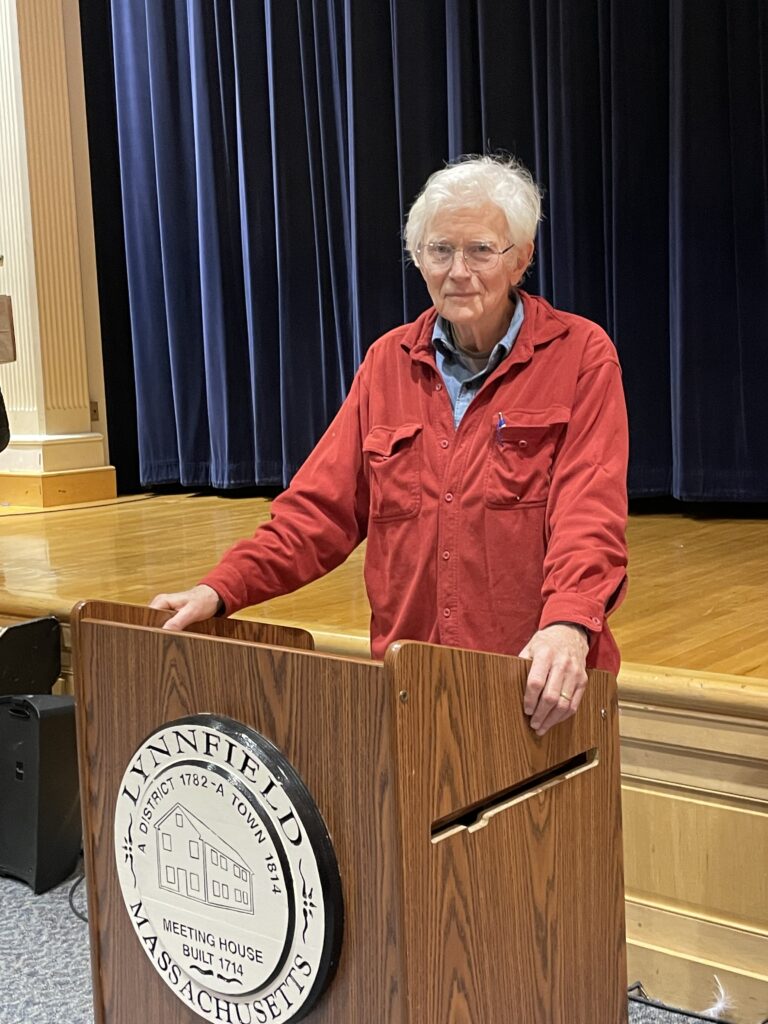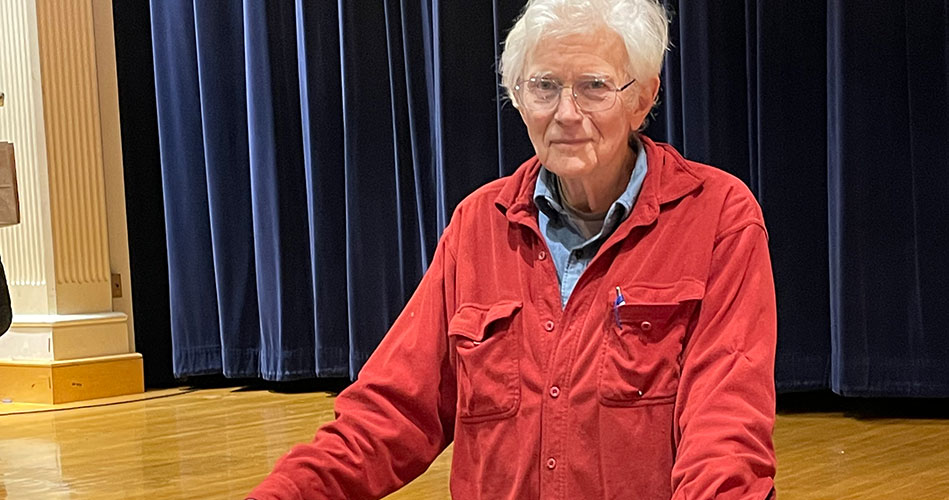
DR. PETER GRAY
By DAN TOMASELLO
LYNNFIELD — Play is necessary for children’s development, Boston College psychology professor Dr. Peter Gray said during a recent presentation in the Lynnfield Middle School auditorium.
A Healthy Lynnfield sponsored Gray’s presentation as part of its “Healthy Conversations, Healthy Kids” series. A Healthy Lynnfield Community Outreach and Engagement Coordinator Diana DeLeo said Gray is a Boston College psychology professor and a published author.
“We really focus a lot on positive childhood experiences and the impact that can have on children long-term as they grow,” said DeLeo. “That is why we thought Peter Gray and his work around play would be an interesting topic to bring to town.”
Gray told the 15 residents who attended the presentation that “play is so valuable for children’s social, emotional and intellectual development.”
“We are in a crisis regarding children’s play that has been building up over decades,” said Gray. “We have gradually been taking children’s play away from them, and we have seen the consequences from that.”
Gray said “the golden age of children’s play” occurred in the first half of the 20th century.
“But around 1960, we began taking that freedom away from children gradually,” said Gray. “Between 1960 and now, there has been a huge change. We have taken up children’s time with more schooling, more homework and more adult-directed activities outside of school. We have developed what I would argue are irrational fears about the dangers of children playing outdoors or walking to school and playing along the way, which children have done in the past. We have deprived children from very important experiences.”
Gray noted that the rates of children suffering from anxiety and depression have increased significantly over the last several decades. He also said children’s suicide rates have increased over the past 60 years.
“By the end of the 20th century, the rate of what today would be diagnosed as major depression was five to eight times it was in the 1950s,” said Gray. “The rates of depression have increased further in the 21st century. Similarly, the rate for generalized anxiety disorder increased five to eight times by the end of the 20th century. The rate of suicide among school-age children is now five times what it was in the 1950s and 1960s.”
Gray said reducing play has negatively affected children’s creativity.
“Play is the most creative thing that children do,” said Gray. “That is how they develop creativity. You can’t teach creativity. You have to let it blossom. If you take play away, you are limiting creativity. We need people to think creatively.”
While Gray noted that children often engage in imaginary situations while playing, he said play is designed to “help children learn about the real world.”
“Play is a step outside of the real world, but its function is to cope with and succeed in the real world,” said Gray.
Gray said “risky play” such as climbing trees and skateboarding teaches children the importance of resiliency and confidence.
“They won’t fall apart when a real emergency happens because they learned how to manage fear,” said Gray. “This is extremely important for children’s development, but our culture today all too often prohibits children from playing in certain ways. That doesn’t mean we should put children in risky situations, but we should allow them to play in risky ways if they choose to do so.”
Gray also said having kids play together teaches them social and collaboration skills.
“Research shows that when children play with one another, their language is far more sophisticated than when talking to an adult because they have to use language to coordinate play,” said Gray. “Children have to negotiate who is going to be the witch and who is going to be the dragon. They are using language for a real purpose.”
Gray said play also teaches children rules.
“Following rules and the ability to create rules is an important ability for human beings,” said Gray. “Children practice that in play. But when children are playing, they have the ability to modify the rules. They are learning the principles of democracy. Children remind one another to follow rules if others are not. Creating and following rules is an extremely important skill.”
Gray said play also teaches children how to get along with other people.
“We are absolutely dependent on getting along with other people in our lives, learning how to cooperate and making friends,” said Gray. “Children practice this all the time in play. Children want to play with other children, ideally with adults are not interfering. They are learning how to get along with their peers. This is an extremely important skill for children to learn.”
Gray said play teaches children problem-solving skills.
“Play is how children learn to take initiation and solve their own problems without having an adult stepping in,” said Gray. “In social play, children learn to negotiate, compromise and how to get along with one another, which is something our Congress hasn’t done.”
Gray also said play helps children discover their passions.
“Some people think play is a waste of time for children because you can’t put it on a resume or help you get into Harvard,” said Gray. “Play is very important because it helps children develop interests that could possibly be pursued in adulthood.”
Gray noted that play teaches children the importance of structure.
“When children play, the first thing they decide is what they are going to play before proceeding to play,” said Gray. “Children learn how to structure an activity and abide by that structure.”
Gray also said play helps children’s physical development and teaches kids how to manage stress.
“We are concerned about loneliness in our culture today,” said Gray. “If we want children to not grow up lonely, we have to allow much more time for social play.”
Planning Board member Page Wilkins asked Gray if he had any advice for educators and parents about encouraging children to play more.
Gray said he has been working with school districts on a variety of issues around play. He has encouraged schools to “reduce the amount of homework” and to “increase recess” for children. He has also recommended that schools be open “for free play both before school and after-school.”
“School is a great place to play,” said Gray. “We are wasting these facilities when school is not open.”
Gray also recommended that schools and families create play clubs for children.
After Gray concluded his presentation, he was given a round of applause.





